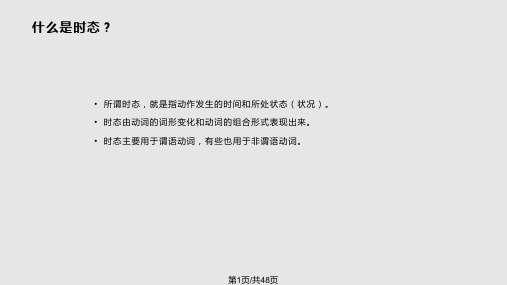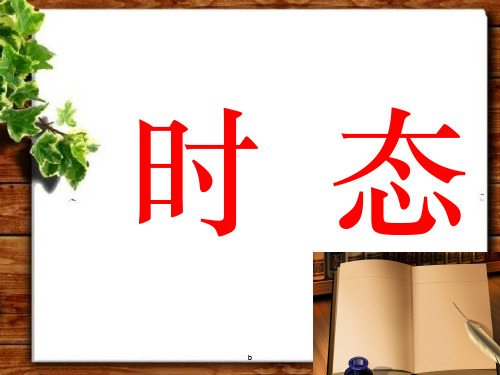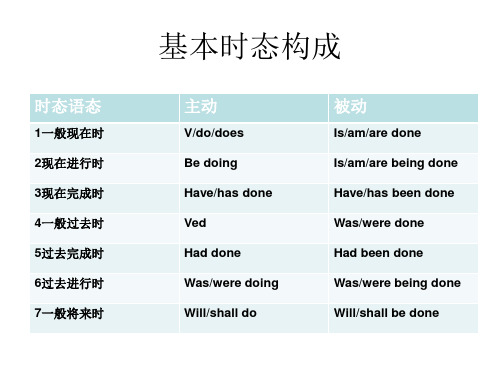一般过去时和现在完成时ppt课件
合集下载
动词时态PPT课件

It can’t be Jim. he has gone to town . John knows the way well. He has been to the city before .
第25页/共48页
D. 瞬间动词和持续性动词 1. 他来北京五天了。
√ He has been in Beijing for 5
过去将来完成时 现在完成进行时
过去完成进行时 将来完成进行时
过去将来完成进行时
第14页/共48页
三、时态的用法
1、一般现在时:是表述现在或经 常性的动作,状态.
A. 表述现阶段或经常性的动作,状态。 他每天骑自行车上学。
He goes to school by bike every day. B. 表客观真理
days.
× He has come to Beijing for 5 days.
第26页/共48页
D. 瞬间动词和持续性动词
2. 小明入团三年了。
Xiao Ming has been in the League for 3 years.
√
√ Xiao Ming has been a League
member for 3 years
Xiao Ming has joined the League for three years.
×
第27页/共48页
D. 瞬间动词和持续性动词
3. 这本书他买了一年了。
He has had this book
√
for a year.
× He has bought this book
练习。
完 成
先结构,
后改1,
完成 和加1
进行
第25页/共48页
D. 瞬间动词和持续性动词 1. 他来北京五天了。
√ He has been in Beijing for 5
过去将来完成时 现在完成进行时
过去完成进行时 将来完成进行时
过去将来完成进行时
第14页/共48页
三、时态的用法
1、一般现在时:是表述现在或经 常性的动作,状态.
A. 表述现阶段或经常性的动作,状态。 他每天骑自行车上学。
He goes to school by bike every day. B. 表客观真理
days.
× He has come to Beijing for 5 days.
第26页/共48页
D. 瞬间动词和持续性动词
2. 小明入团三年了。
Xiao Ming has been in the League for 3 years.
√
√ Xiao Ming has been a League
member for 3 years
Xiao Ming has joined the League for three years.
×
第27页/共48页
D. 瞬间动词和持续性动词
3. 这本书他买了一年了。
He has had this book
√
for a year.
× He has bought this book
练习。
完 成
先结构,
后改1,
完成 和加1
进行
一般过去时与现在完成时的区别ppt_Jennifer

going to be doctor when you 1. _____you Are ___________a grow up? A. Will; going to be B. Are; going to be C. Are; / D. Will; be will come 2. I don‘t know if his uncle ____________. I think hewill ____________ if it doesn‘t rain. come A. will come; comes B. will come; will come C. comes; comes D. comes; will come 3. He will be back _____a few minutes. D A. with B. for C. on D. in
A B
4. We__ to the park if it is fine tomorrow.
1.Students will go to school in the future.(一般疑问句)
Will __ students
2.There will be some robots in our homes.(改为否定句)
1.Ihope that you__ a good time this evening. C A.have B.are having C.will have D.has 2.Look at those big black clouds. It __rain.Let`s hurry. D A.must B.will C.would D.is going to
• Linda has a big house. (现在情况) • She bought the house ten years ago. (过
英语时态8种基本时态讲解.ppt课件

4)动词过去式变化规则。 a)一般情况下的词加-ed. work---worked call----called b)以不发音的字母e结尾的单词直接加-d . live----lived change----changed smoke----smoked die----died graduate----graduated drive----drove
8.过去完成时 表示动作发生在过去某一时间之前已经完成的动作或状态, 强调“过去的过去”, 常与 by the time, by the end of…,before , by 等引导时间的状语连用。
基本结构 主语+ had + 动词过去分词 + 其他成分 When I got to the cinema yesterday the film had begun already. He had learned English before he came here.
现在完成时与一般过去时的区别: 1)现在完成时侧重于对现在的影响;而一般过去时侧重于某一动作发生在过去某个时间或某段时间。即现在完成时侧重于现在的结果,而一般过去时侧重于动作发生的时间。例如:
I have seen the film. 我看过这部电影。(现在我仍记得电影的内容) I saw the film three days ago. 三天前我看了这部电影。(强调是三天前,而不是别的什么时候看的电影)
be going to含有“打算,准备”的意思,而will则没有这个意思, She is going to lend us her book. He will be here in half an hour.
be about to+V.原形(意为马上做某事,在时间上指最近的将来) I am about to leave school. 不能与表示时间的副词连用。 They are about to set out.(√) They are about to set,变y为i加-ed. study----studied carry----carried cry----cried try----tried d)以元音字母+y结尾的单词直接加-ed. play----played stay----stayed
8.过去完成时 表示动作发生在过去某一时间之前已经完成的动作或状态, 强调“过去的过去”, 常与 by the time, by the end of…,before , by 等引导时间的状语连用。
基本结构 主语+ had + 动词过去分词 + 其他成分 When I got to the cinema yesterday the film had begun already. He had learned English before he came here.
现在完成时与一般过去时的区别: 1)现在完成时侧重于对现在的影响;而一般过去时侧重于某一动作发生在过去某个时间或某段时间。即现在完成时侧重于现在的结果,而一般过去时侧重于动作发生的时间。例如:
I have seen the film. 我看过这部电影。(现在我仍记得电影的内容) I saw the film three days ago. 三天前我看了这部电影。(强调是三天前,而不是别的什么时候看的电影)
be going to含有“打算,准备”的意思,而will则没有这个意思, She is going to lend us her book. He will be here in half an hour.
be about to+V.原形(意为马上做某事,在时间上指最近的将来) I am about to leave school. 不能与表示时间的副词连用。 They are about to set out.(√) They are about to set,变y为i加-ed. study----studied carry----carried cry----cried try----tried d)以元音字母+y结尾的单词直接加-ed. play----played stay----stayed
英语现在完成时和一般过去时(共10张PPT)

I’ve never seen her as angry as that, so I kept quiet.
Tips
a. come, arrive, buy, hear等终止性动词的现在完成时一般不能与表 示一段时间的状语连用。
He has joined the army for three years. (false) He has been a soldier for three years. (right) He has been in the army for three years. (right)
b. hear等词的否定式可以与for等引起的表示一段时间状语连用。例如:
I haven’t heard from you for weeks.
二. 一般过去时
1.结构:主语+动词过去式
2.表示过去某时发生的动作或存在的状态,常和a moment ago,
half an hour ago, just now, yesterday, last week, in 2005, in
work and stepped out into
the fog 5、有时地点状语也会影响时态的应用:
4. 表示过去时间内经常或习惯性的动作或状态。例如: 动作或状态从过去开始一直持续到现在,并有可能再持续下去,
We soon became good friends.
I saw the film last night.
had Beijing
its hottest day yesterday since 1997.
I ___ in London for many years, but I’ve never regretted my final decision to move back to China.
Tips
a. come, arrive, buy, hear等终止性动词的现在完成时一般不能与表 示一段时间的状语连用。
He has joined the army for three years. (false) He has been a soldier for three years. (right) He has been in the army for three years. (right)
b. hear等词的否定式可以与for等引起的表示一段时间状语连用。例如:
I haven’t heard from you for weeks.
二. 一般过去时
1.结构:主语+动词过去式
2.表示过去某时发生的动作或存在的状态,常和a moment ago,
half an hour ago, just now, yesterday, last week, in 2005, in
work and stepped out into
the fog 5、有时地点状语也会影响时态的应用:
4. 表示过去时间内经常或习惯性的动作或状态。例如: 动作或状态从过去开始一直持续到现在,并有可能再持续下去,
We soon became good friends.
I saw the film last night.
had Beijing
its hottest day yesterday since 1997.
I ___ in London for many years, but I’ve never regretted my final decision to move back to China.
英语八大时态PPT课件(详细版)

b
15
He is a lazy man . He ____the dirty jeans every day.(2014 )
A. always wears B. always wearing C. always to wear D. is always wearing
You will know the truth after you ___him.(2013) A. see B. will see C. are seeing D.to see
b
16
三、一般过去时
1、构成 一般过去时用动词的过
去式表示。除系动词be的过去式 有人称和数的变化外,其他动词 的过去式无人称和数的变化。
b
17
2、用法
※表示过去已经发生的动作,现在 已经结束,常与相应的过去时间状 语连用。 Tom fell ill last night , and he had to stay at home.
【翻译】
我今年20岁,住在北京。 I am twenty years old this year , and I live in Beijing.
火车将在一个小时后(in an hour)出发(set off)。 The train sets off in an hour.
她每天都走路上学。 She walks to school every day. 或:She goes to school on foot every day.
If it doesn’t rain tomorrow,we’ll
go shopping.
பைடு நூலகம்
b
6
常与一般现在时连用的时间状语有:
often 经常
高三英语现在完成时与过去完成时课件(共19张PPT)

A: What had you done before you I _h__a_d_w__a_tc_h_e_d__(watch) TV.
A: What __a_re___ you _d_o_i_n_g__(do) now?
B: I __a_m__w_r_i_t_in_g___(write) a letter to my friend Tom.
The Past Perfect Tense 过去完成时态
have/has+过去分词
1.现在完成时态表示过去发生的动作对现在造成的影响或 结果
Our teacher has left. We have studied English. I have already finished the homework. He has had his lunch. He has become a doctor.
5. 根据上下文判断 I went to Li Hong’s house, but he ___h_a_d_g_o_n__e__(go) out.
Fill in each blank with the proper verb form: 1. He said that he _h_a_d__w_r_it_t_e_n_ (write) that letter.
So
I
__a_m__a_n_s_w_e_r_i_n(ganswer)
his
A: When _w__il_l____ you ___p_o_s_t__(post) it?
B: I _w_i_l_l _p_o_st__(post) it as soon as I _f_in__is_h___(finish) writing.
5. Mary told me she __h_a_d__m__et___(meet) my mother before.
初中英语中考复习时态讲解课件(共79张ppt)

一般现在时
1. 表示经常性或习惯性的动作
She does excersice everyday.
真题链接
—What do you often do at weekends?
—I often ____ my grandparents.
A. visit
B. visited
C. have visited D. will visit
Just a moment, I am washing dishes.
when
习题
Just a minute! My brother________ his car in the garden. A. washes B. is washing C. washed D. will wash
习题
---Hey, Tom. Let’s go swimming.
动词过去分词 不规则变化
speak hear see give build swim buy teach
spoken heard seen given built swum bought taught
现在完成时
already yet
1.过去发生或已完成的某一动作对现在的影响。
I have already watched this film. I haven't watched this film yet. I have already visited America. I haven't visited America yet.
A. prepares
B. is preparing
C. has prepared D. prepared
真题链接
--Mum, it's late. Why are you still here? --Dad hasn't come back yet. I ____ for him. A. am waitingB. was waiting C. waited D. had waited
英语十六种时态ppt课件

He went swimming yesterday. 昨天他去游泳了。 He was ill yesterday. 他昨天病了。
6
2.一般过去时的肯定、疑问、否定三种形式
肯定式
疑问式
否定式
I worked.
Did I work?
I did not work.
He (She, It)worked. Did he (she, it) work? He (She, It) did not work.
13
范围扩展
1. 用过去进行时表示现在主要是为了使语气委婉、客气。 I was wondering if you can give me a lift. 我不知你能否让我搭一下车。 (一般过去时也有类似用法,但比较而言,用过去进
行时显得更客气,更加不肯定。)
2.动词be的过去进行时也可表示过去一时的表现或暂时的 状态。
现在进行时表示说话时正在进行的动作或表示目前一段时 间内正在进行的活动,与现在进行时连用的时间状语有now, these days等。
—What is your mother doing now? 你的妈妈正在干什么? —She is cooking for us. 她正在为我们做饭。 2.现在进行时的具体用法
10
用法
例句
(1) 说话瞬间正在发生的动作,常见的时间 They are watching TV now.
状语有now,at the moment等。如果句首有 他们现在正在看电视。
警示性动词look,listen等,主句的动词也 Listen! The bird is singing in the tree.
(2) be (am, is, are) going to + 动词原形 2.一般将来时的用法
6
2.一般过去时的肯定、疑问、否定三种形式
肯定式
疑问式
否定式
I worked.
Did I work?
I did not work.
He (She, It)worked. Did he (she, it) work? He (She, It) did not work.
13
范围扩展
1. 用过去进行时表示现在主要是为了使语气委婉、客气。 I was wondering if you can give me a lift. 我不知你能否让我搭一下车。 (一般过去时也有类似用法,但比较而言,用过去进
行时显得更客气,更加不肯定。)
2.动词be的过去进行时也可表示过去一时的表现或暂时的 状态。
现在进行时表示说话时正在进行的动作或表示目前一段时 间内正在进行的活动,与现在进行时连用的时间状语有now, these days等。
—What is your mother doing now? 你的妈妈正在干什么? —She is cooking for us. 她正在为我们做饭。 2.现在进行时的具体用法
10
用法
例句
(1) 说话瞬间正在发生的动作,常见的时间 They are watching TV now.
状语有now,at the moment等。如果句首有 他们现在正在看电视。
警示性动词look,listen等,主句的动词也 Listen! The bird is singing in the tree.
(2) be (am, is, are) going to + 动词原形 2.一般将来时的用法
- 1、下载文档前请自行甄别文档内容的完整性,平台不提供额外的编辑、内容补充、找答案等附加服务。
- 2、"仅部分预览"的文档,不可在线预览部分如存在完整性等问题,可反馈申请退款(可完整预览的文档不适用该条件!)。
- 3、如文档侵犯您的权益,请联系客服反馈,我们会尽快为您处理(人工客服工作时间:9:00-18:30)。
1. ---What ___ Mr. Jones ___ before he moved here?
---He drove a city bus.
A. did, do
B. does, do
C. do, do
2. Jane ____ a new dress every month when she was in Shanghai.
A. lived
B. will live .
C. has lived
如何判断一般过去时
1. 表示过去某个时间发生的动作或存在的状态. (常与yesterday, yesterday morning, two days ago, just now, last week/last month/last year, on that day, at that time, in 2001…等时间状 语连用)
A. will have
B. has
C. hou ___ your old friend? ---The day before yesterday.
A. will, visit
B. did, visit
C. have visited
4. ---How long ___ Mrs. Green ___ here?
4. 我以前从没骑过马. I _h_a_v_e___ never _r_i_d_d_e_n_ a horse before. 5. 你爸爸在哪? 他去了英国. Where is your father? He __h_a_s__g_o_n_e__t_o______ England.
2. t他w刚ice回, 来ju.st, before, still, so far, in the last 10 3.Hy你ee曾ahar经ss,跟jrue外scte国cno人tmly说e, eb国av话cekr吗. s?ince等连用. (already _H_常a_v_e_用__于yo肯u 定eve句r _,_sy_pe_o_tk_e用_n_于to否a f定or句eig,n疑er?问句.)
B. ever
C. never
9. Peter lost his bike yesterday. ___ he ___ it yet?
A. Has…looked for
B. Does… find
C. Has …found
10. My brother left school in 2005, and since then he ____ in Beijing.
一般过……去……时….. & 现在完成时
.
前提测评
1. Our teacher ___ English on the radio the day before yesterday.
A. teaches
B. taught
C. had taught
2. The boy thought for a while and ___ an idea.
all day.
A. tells
B. told
C. has told
3. ---How was your weekend?
---Great! We ______ a picnic by the lake.
A. have
B. are having C. had
4. ---Haven’t I told you I like coffee without
sugar?
---Sorry. But I only
a little.
A. am putting B. put .
C. will put
现在完成时
构成: have/has + 动词的过去分词
1用.我法已: 1做. 完过作去业的了动. 作对现在所造成的影响. I have a常lre与adaylrfeinaidsyh,eydemt,ynheovmeerw, eorvke.r, once,
A. buys
B. will buy
C. bought
3. How clean the classroom is! When
you
it?
A. do, clean
B. did clean
C. have, cleaned
4. 当我还是一个小孩的时候, 我经常在街上踢足球.
___I_o__ft_e_n__p_la__y_e_d_f_o_o_t_b_a_l_l___.in summer when he was young.
A. has swept B. is sweeping C. have swept
7. Uncle Wang has worked in the factory ___ 30 years.
A. for
B. since
C. over
8. Have you ___ seen a black man?
A. before
1.---I have seen the film “Titanic (铁达尼号)” .
---When
you
it?
A. have, seen B. did, see
C. will see
2. ---What did the teacher say just now?
---He ______ us not to play computer games
---About half a year.
A. did, live
B. has, lived C. have, lived
5. The students haven’t visited a museum ___.
A. already
B. ever .
C. before
6. Someone ___ the classroom. Look! How clean it is!
Jim刚才在这里. Jim was here a moment ago.
你一小时前去哪儿了? Where did you go an hour ago?
.
2. 表示过去一段时间经常发生的动作或存在的状态. (常与often, usually, always, sometimes等时间 状语连用 ), 另外由when引导特殊疑问句用一般过 去时,还有由after, before, when引导的时间状语 状语从句。
---He drove a city bus.
A. did, do
B. does, do
C. do, do
2. Jane ____ a new dress every month when she was in Shanghai.
A. lived
B. will live .
C. has lived
如何判断一般过去时
1. 表示过去某个时间发生的动作或存在的状态. (常与yesterday, yesterday morning, two days ago, just now, last week/last month/last year, on that day, at that time, in 2001…等时间状 语连用)
A. will have
B. has
C. hou ___ your old friend? ---The day before yesterday.
A. will, visit
B. did, visit
C. have visited
4. ---How long ___ Mrs. Green ___ here?
4. 我以前从没骑过马. I _h_a_v_e___ never _r_i_d_d_e_n_ a horse before. 5. 你爸爸在哪? 他去了英国. Where is your father? He __h_a_s__g_o_n_e__t_o______ England.
2. t他w刚ice回, 来ju.st, before, still, so far, in the last 10 3.Hy你ee曾ahar经ss,跟jrue外scte国cno人tmly说e, eb国av话cekr吗. s?ince等连用. (already _H_常a_v_e_用__于yo肯u 定eve句r _,_sy_pe_o_tk_e用_n_于to否a f定or句eig,n疑er?问句.)
B. ever
C. never
9. Peter lost his bike yesterday. ___ he ___ it yet?
A. Has…looked for
B. Does… find
C. Has …found
10. My brother left school in 2005, and since then he ____ in Beijing.
一般过……去……时….. & 现在完成时
.
前提测评
1. Our teacher ___ English on the radio the day before yesterday.
A. teaches
B. taught
C. had taught
2. The boy thought for a while and ___ an idea.
all day.
A. tells
B. told
C. has told
3. ---How was your weekend?
---Great! We ______ a picnic by the lake.
A. have
B. are having C. had
4. ---Haven’t I told you I like coffee without
sugar?
---Sorry. But I only
a little.
A. am putting B. put .
C. will put
现在完成时
构成: have/has + 动词的过去分词
1用.我法已: 1做. 完过作去业的了动. 作对现在所造成的影响. I have a常lre与adaylrfeinaidsyh,eydemt,ynheovmeerw, eorvke.r, once,
A. buys
B. will buy
C. bought
3. How clean the classroom is! When
you
it?
A. do, clean
B. did clean
C. have, cleaned
4. 当我还是一个小孩的时候, 我经常在街上踢足球.
___I_o__ft_e_n__p_la__y_e_d_f_o_o_t_b_a_l_l___.in summer when he was young.
A. has swept B. is sweeping C. have swept
7. Uncle Wang has worked in the factory ___ 30 years.
A. for
B. since
C. over
8. Have you ___ seen a black man?
A. before
1.---I have seen the film “Titanic (铁达尼号)” .
---When
you
it?
A. have, seen B. did, see
C. will see
2. ---What did the teacher say just now?
---He ______ us not to play computer games
---About half a year.
A. did, live
B. has, lived C. have, lived
5. The students haven’t visited a museum ___.
A. already
B. ever .
C. before
6. Someone ___ the classroom. Look! How clean it is!
Jim刚才在这里. Jim was here a moment ago.
你一小时前去哪儿了? Where did you go an hour ago?
.
2. 表示过去一段时间经常发生的动作或存在的状态. (常与often, usually, always, sometimes等时间 状语连用 ), 另外由when引导特殊疑问句用一般过 去时,还有由after, before, when引导的时间状语 状语从句。
